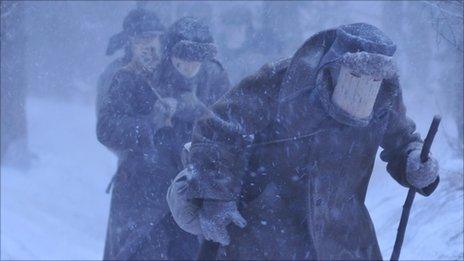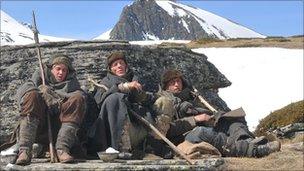How The Long Walk became The Way Back
- Published

There is evidence that someone really did make the remarkable trek
A few years ago, Australian director Peter Weir couldn't get something out of his mind.
It was a story dating back more than 60 years. A simple story of a group of men among stark deserts and terrifying peaks, testing the limits of human existence.
The director, celebrated for contemporary classics such as The Truman Show, was hooked.
"As a feat of endurance and courage and the tenacity of human beings to survive, I thought it was superb. And it stayed with me," he said.
"The usual way of testing a story is, 'does it stay with you enough to want to pursue it as a film?' And this was the case."
The story was The Long Walk, a gripping account of a Polish officer's imprisonment in the Soviet gulag in 1940, his escape and then a trek of 4,000 miles (6,437km) from Siberia to India, surviving unimaginable hardships along the way.
Mr Weir decided it had to be his next film.
"But I just had one small throwaway question and I didn't expect the answer I got," he says.
"It is true? As it says on the cover, right?" he asked.
"And there was a silence and the producer said: 'Well, there's a controversy.'"
No evidence
That controversy has persisted ever since the book on the subject first appeared in 1956. Right from the start, no-one could find information to prove or disprove whether the author, Slavomir Rawicz, was telling the truth, as he claimed.
There were no documents, no evidence, and all trace of his fellow escapees had vanished.
Four years ago, I produced a documentary for BBC Radio 4 on the subject, hoping to track down the evidence to show that Rawicz really had done this incredible feat.
That documentary led Peter Weir to us.
"I contacted Hugh Levinson, the producer of this programme, having heard the BBC radio programme that actually raised the question of its veracity in a very sharp way and began my own investigation," he said.
"And out of that I came to the conclusion that I couldn't be sure that Slavomir Rawicz was himself on this long walk. He was certainly arrested and imprisoned - but did he do the walk?"
The evidence we found suggested the answer was No.
We saw documents , externalthat suggested that Rawicz had not told the truth about his past, and that although he had been a prisoner in the gulag, he never escaped.
Unknown hero
A few weeks after our documentary aired, there was a baroque twist. An anonymous letter arrived, suggesting we contact a man who might be of interest.

Director Peter Weir dedicates the film to three unknown survivors
It led us to Camborne in Cornwall, to the home of Witold Glinski.
He is an elderly Pole, courteous with a wry sense of humour - and an extraordinary story to tell.
He was interned in the gulag and, just like Rawicz, he escaped in a snowstorm. Just like Rawicz, he took the same route, surviving the heat of the Gobi Desert and the heights of the Himalayas, with one instinct forcing him on.
"I thought: I'm going to get a plane, train as a pilot, and then I get high, fly to Moscow, look for the Kremlin and blast it out of the ground," he said.
"That was my ambition, what was driving me. This was the driving force inside me, revenge for what the Germans and Russians did."
Glinski said he even shared some companions with Rawicz - such as a young Polish girl who died along the walk, and an enigmatic American known only as Mr Smith.
Strange encounter
Was it possible that Glinski was the real hero and that Rawicz had stolen his story? Perhaps. We could find no evidence to corroborate Glinski's vivid account of his escape and trek.
Yet there might be a clue in what he described as a strange encounter in a street in London in the 1940s. Glinski says two men approached him, one a bedraggled Polish officer, the other a dapper Englishman.
"They said, 'Are you Witold Glinski?'
"I said, 'Yes, what do you want?'"
He said they wanted to talk to Glinski about writing Polish history and that they were interested in where he came from and how he got to England.
"I said, 'I don't have anything to tell you'," Glinski recalled.
Later he realised that the Englishman was a journalist called Ronald Downing - the ghost writer of The Long Walk.
He suspects that Downing had somehow acquired a transcript of a debriefing interview in which Glinski recounted his story, and that he later conspired with Rawicz to pretend the story was his.
And there is more evidence that even if Rawicz didn't do the walk, someone else did.
We learned of a British intelligence officer who said he had interviewed a group of haggard men in Calcutta in 1942 - a group of men who had escaped from Siberia and then walked all the way to India.
And then from New Zealand came news of a Polish engineer who had apparently acted as an interpreter for this very same interview in Calcutta with the wretched survivors.
These stories are second-hand, and far from conclusive proof, but for Mr Weir, they convinced him that there was an essential truth in the story that he wanted to retain.
"There was enough for me to say that three men had come out of the Himalayas, and that's how I dedicate my film, to these unknown survivors. And then I proceed with essentially a fictional film."
This is why the film - to be released later this month - has a new title, The Way Back, and why the central character is not called Slavomir Rawicz.
Yet it retains its power as a tale of courage and endurance.
"It's about the struggle that all of us have to survive every day," Mr Weir says.
"This is on an epic scale, but survival is at the heart of it, and what keeps you going with all the difficulties and pain of life and the bad luck."
The Long Walk will be broadcast on BBC Radio 4 at 13.30 on Sunday 5 December. The Way Back opens in the UK on 26 December 2010.